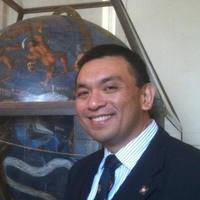- Career Ambassador.edit
Presentation before the 2018 Sister Cities New Zealand
Conference (Lower Hutt, Wellington Region, 24 May 2018) on Universal Diplomacy - a framework for multi-stakeholder diplomacy engaging Embassies, Cities and Citizens.
Conference (Lower Hutt, Wellington Region, 24 May 2018) on Universal Diplomacy - a framework for multi-stakeholder diplomacy engaging Embassies, Cities and Citizens.
Research Interests:
• More than forty thousand Filipinos in New Zealand making up nearly 1% of the population join our millions of countrymen in the Philippines and around the world in remembering, and celebrating with gratitude and thanksgiving what our... more
• More than forty thousand Filipinos in New Zealand making up nearly 1% of the population join our millions of countrymen in the Philippines and around the world in remembering, and celebrating with gratitude and thanksgiving what our forefathers did 118 years ago to win the Philippines' rightful place in the community of nations and have the Filipino people's respected voices for freedom, democracy and the rule of law heard in the councils of the world. • We celebrate the 116 th Anniversary of the Proclamation of Philippine Independence amidst the Philippines' continued recognition as one of Asia's newest economic success stories, a winner of several investment grade credit ratings and a favorable destination for thriving trade, tourism, investment and business.
Diplomacy has many definitions, some of them charitable. A popular one, to paraphrase poet Robert Frost, is the practice of remembering a lady’s birthday but forgetting her age. Levity aside, diplomacy entails the conduct of relations... more
Diplomacy has many definitions, some of them charitable. A popular one, to paraphrase poet Robert Frost, is the practice of remembering a lady’s birthday but forgetting her age. Levity aside, diplomacy entails the conduct of relations between and among nation-states and international organizations. Diplomacy may be political, legal, economic, cultural, or scientific in nature. Diplomacy is conducted on three levels: multilateral, engagement in the work of the United Nations (UN) system; regional, involving activity within a geographic region or regional organization such as the North Atlantic Treaty Organization (NATO) or the Association of Southeast Asian Nations (ASEAN); and bilateral, referring to the relations between a particular pair of nations. While diplomacy is usually the domain of Foreign Service officials, international civil servants, and other government specialists, there is also track two diplomacy pursued in parallel among academic, scientific, professional, and other civil society communities. Such diplomacy may manifest itself in various forms such as the holding of academic conferences, the networking among experts, and the policy interventions of think tanks and non-governmental organizations (NGOs). In the wake of 9/11 the various international nonproliferation conventions on chemical, biological, radiological, and nuclear Weapons of Mass Destruction (WMDs) have assumed unprecedented importance. UN Security Council Resolution 1540, passed in 2004, calls on all UN members to give high priority to joining and implementing the non-proliferation treaty regimes including the Biological Weapons Convention (BWC). The purposes of the BWC are made clear from its formal title: “Convention on the Prohibition of the Development, Production and Stockpiling of Bacteriological (Biological) and Toxin Weapons and on their Destruction.” In summary, the BWC’s provisions call on the world community to: Article I: Never under any circumstances to acquire or retain biological weapons. Article II: To destroy or divert to peaceful purposes biological weapons and associated resources prior to joining. Article III: Not to transfer, or in any way assist, encourage, or induce anyone else to acquire or retain biological weapons. Article IV: To take any national measures necessary to implement the provisions of the BWC domestically. Article V: To consult bilaterally and multilaterally to solve any problems with the implementation of the BWC. Article VI: To request the UN Security Council to investigate alleged breaches of the BWC and to comply with its subsequent decisions. Article VII: To assist states which have been exposed to a danger as a result of a violation of the BWC. Article X: To do all of the above in a way that encourages the peaceful uses of biological science and technology. The scope of the BWC and related activity can also be summed up in two general thrusts: promoting biosafety or protecting people from germs, and advancing biosecurity or protecting germs from people. As the BWC seeks to promote biosafety and biosecurity on a global scale, we have seen biosafety diplomacy emerge on the international scene. The biosafety professional has also become a diplomat, providing the necessary scientific and technical expertise for the implementation of the BWC and improving international biosafety and biosecurity practice. The traditional diplomat, normally a jack-of-all-trades, is in turn expected to master at least the fundamentals of biosafety when tasked to promote the BWC.
Research Interests:
The article gives an overview of the Biological Weapons Convention (BWC) regime, and its place in the overall Weapons of Mass Destruction (WMD) Treaties framework. It also discussed the lead-up to, conduct and significance of the "BWC... more
The article gives an overview of the Biological Weapons Convention (BWC) regime, and its place in the overall Weapons of Mass Destruction (WMD) Treaties framework. It also discussed the lead-up to, conduct and significance of the "BWC Superweek for East Asia & the Pacific" held in Manila in June 2011.
